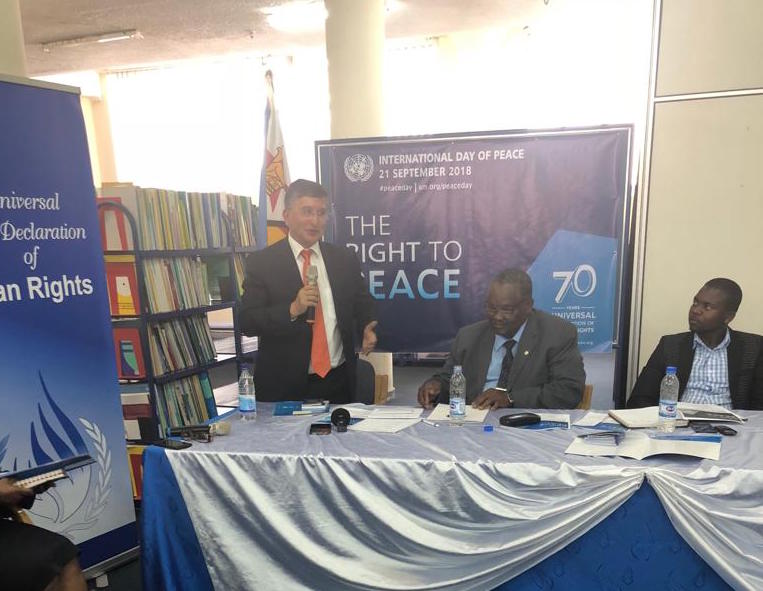By Byron Mutingwende
The thorny Gukurahundi issue will not be swept under the carpet until a resolution is found, the National Peace and Reconciliation Commission (NPRC) has said.
Retired Justice Selo Masole Nare, the NPRC Chairperson, made the remarks during a Panel Discussion on the Right to Peace – Universal Declaration of Human Rights’ 70th commemoration held on Wednesday 26 September 2018 at the United Nations Information Centre (UNIC) in Harare.
“The issue of the Gukurahundi – the disturbances in Matebeleland and Midlands provinces, that happened in the early years of our independence, will not be buried in the ground until the matter is resolved.
“The commission is currently seized with the matter and we will send some of our commissioners to the provinces. Recently, one of our commissioners addressed the issue in Beitbridge during a church service held there,” Commissioner Nare said.
In his keynote address, Commissioner Nare said the decision by the world leaders the United Nations Assembly to establish the International Day of Peace to designate September 21 as the day that all warring parties should lay down their arms and observe a 24 hour global ceasefire stands out as a pillar of peace the world over.
He said the symbolism of a day without fighting is a critical reminder that conflicts can and must come to an end. Human beings are the cause of conflicts and only human beings can stop conflicts.
“Peace is a human right like any other right enhanced in the Universal Declaration of the United Nations General Assembly Resolution 217 of December 10, 1948.
Commissioner Nare equated the right to peace to that of life, shelter, freedom of assembly and association, health and political participation, among others.
“Peace is another name for development. Peace reinforces conditions for development and liberates the resources needed for societies to develop and prosper. Any sustainable development efforts become the building blocks for peace in the national and global peace architecture,” Commissioner Nare added.
Micaiah Chandimhora, the Project Officer of a youth organisation called The Space said peace goes beyond being silent. Rather, it is the peace of freedom and of just laws of happiness, equality, and solidarity, in which citizens count, libe together and share.
Chandimhora said curbing wars, conflict and violence is not a matter of the government alone but of the society as a whole (including civilian, military, and religious bodies).
“Youth participation in electoral and governance processes can go a long way in inclusivity, co-existence, maintenance and preservation of peace. Across the globe, conflict has erupted, especially when certain sections in society feel neglected as far as development, resource allocation and general participation on matters of human development and national growth are concerned,” Chandimhora said.
Young people are undoubtedly the most formidable demographic group that, if neglected, particularly on issues of governance and democracy, can pose a threat to peace and stability of any nation. Treasure Basopo, the director 0f Tete a’ Tete bemoaned the fact that Zimbabwe has gone through turbulent phases since colonisation and encouraged all stakeholders to work towards promoting a peaceful discourse for the benefit of future generations.
Revai Makanje Aalbaek, the Head of Governance and Gender Mainstreaming of the United Nations Development Programme (UNDP), who was standing in for Bishow Parajuli, the UN Resident Coordinator for Zimbabwe, said peace has different meanings to different groups of people.
“To a girl in high school, peace may mean an environment free from sexual abuse and exploitation. To an elderly woman in the rural areas, it may mean a safe environment when fetching firewood in the forest. To a boy in high school peace may mean a world free from harmful substances.
“However, there are worrying global statistics which emphasise the importance of preserving peace. Over half a million lives are lost to violence every year. On the other hand, over 65 million people flee their homes due to conflicts every year. Globally, about $4, 3 trillion is lost annually to conflicts. As the UN we provide pathways for promoting peace at the community, national and global levels,” Makanje said.
In his complementary remarks, Mr Bishow parajuli said peace is the foundation for development and becomes the most basic human element.
“As a society we should foster peace as a way of bringing about development in our country. This should be coupled by prioritise equality and empowerment for the women and youths in our programming,” Mr Parajuli said.
Barbra Van Hellemond, the Ambassador of Netherlands to Zimbabwe encouraged leaders of various political parties to do more in calling for the promotion of peace at all times.






